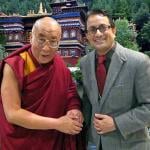
Just published in Interpreter: A Journal of Latter-day Saint Faith and Scholarship:
Amanda Colleen Brown, “Never Static, Never Simple: One Woman’s Conversations Within the Marginalia of If Truth Were a Child”
Review of George B. Handley, If Truth Were A Child: Essays, (Provo, Utah: Neal A. Maxwell Institute for Religious Scholarship, 2019), 253 pp. $19.99 (paperback).
Abstract: George B. Handley challenges his readers to reevaluate conventional definitions of truth and the approaches they employ to define their own truths. He argues that the individual quest for truth should include as many available resources as possible, whether those resources are secular or religious. His framework of intellectual and religious experience allows him to discuss truth in the context of literary theory and of the events that shaped his own faith. My review focuses on four themes: balancing experience and learning, balancing the individual and the community, balancing answers and faith, and balancing individual readings of holy texts. Ultimately, Handley’s discussion of those themes gives readers the tools to navigate the current public discourse more effectively, empowering them to look beyond their own perspectives to discover the good in everyone and find balance in their lives.
***
Dr. Hales Swift continues his helpful series of brief Gospel Doctrine course-related videos for the Interpreter Foundation website with
His video is accompanied by a transcript.
***
I have previously explained — at least briefly — why I regard the work of Brian Stubbs as potentially so very important”
“Were there Near Eastern languages in ancient America?”
It scarely needs saying that this idea is controversial. And, here, Dr. Jeff Lindsay weighs in again on a recent flare-up in that controversy:
“Bad Math and the Premature Dismissal of Brian Stubbs’ Work on Uto-Aztecan Languages”
***
An anecdotal report from New York City:
“Americans Are Exiling Church From Their Lives”
You can confirm the same impression by watching movies and television, in which very few people are ever shown attending or even mention church or synagogue. (The pleasant exception is Blue Bloods, in which the Reagan family regularly pray at the Sunday dinner table and, not uncommonly, reflect their Catholic faith in other ways, as well.)
But is this trend to secularism healthy? Not necessarily:
“For anxious young adults, religion can be a wellness tool, says new study”












